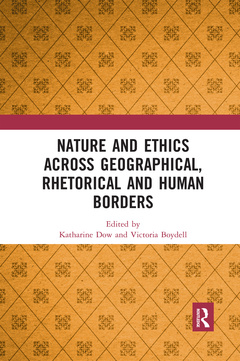Nature and Ethics Across Geographical, Rhetorical and Human Borders
Coordonnateurs : Dow Katharine, Boydell Victoria

How we dispose of our rubbish, choose the foods we buy, enjoy art, relate to our families, and think about ourselves are just a few of the ways that ideas about nature shape our everyday ethical decisions. Nature and ?natural facts? have long been used to make sense of why we act a certain way. Nature is a concept with great power: when we describe something as ?natural? or ?unnatural?, it has a moral force and political consequences. We see this in moral panics about genetically modified foods, the spread of government-enforced waste recycling schemes, concerns about assisted reproductive technologies. Our ideas about what is natural shape our ethical thinking, in terms of how people live (or want to live) their lives, but also in guiding our sense of morality, justice and truth.
The idea of naturalness is essential to grasping Anglo-American cultures. Throughout history and in different places, nature has had different forms, meanings, and moral valences. It is a knowable fact, but at the same time almost a divine principle that is ultimately unfathomable. Yet with the rise of new technologies, there is increasing uncertainty about what we claim to be natural, who we are, how we are related to each other, and how we should live.
This book examines the how ideas about nature and ethics overlap and separate across cultural, species, geographic, and moral boundaries. It compares the varied ways in which nature and ideas of naturalness pervade all aspects of people?s lives, from family relationships, to the production and consumption of food, to ideas about scientific truth. In a world of increasing uncertainty, nature remains a powerful concept: the ultimate reference point, invested with profound moral authority to guide our ethical behaviour. This book was originally published as a special issue of Ethnos.
Introduction: Nature and Ethics Across Geographical, Rhetorical and Human Borders1. ‘Natural’ Breastfeeding in Comparative Perspective: Feminism, Morality, and Adaptive Accountability2. The Ethics of Patenting and Genetically Engineering the Relative Hāloa3. Snared: Ethics and Nature in Animal Protection4. ‘A Nine-Month Head-Start’: The Maternal Bond and Surrogacy5. A Response to the Issues Raised in the Special Edition of Ethnos
Katharine Dow is a senior research associate in the Reproductive Sociology Research Group at the University of Cambridge, UK. Her main research interest is the ethical dilemmas and questions provoked by reproduction and assisted reproductive technologies
Victoria Boydell is an Affiliated Scholar in the Reproductive Sociology Research Group at the University of Cambridge, UK. Her main research interest is social and cultural dynamics around contraceptive technologies.
Date de parution : 08-2020
15.6x23.4 cm
Date de parution : 02-2018
15.6x23.4 cm
Thèmes de Nature and Ethics Across Geographical, Rhetorical and... :
Mots-clés :
Taro Leaf Blight; Apple Snails; Ethnos; Menstrual Cup; Anglo-American culture; UK Nurse; food production; Cherry Laurel; food consumption; Non-human Animals; maternity; UK Response; parental bonds; Taro Farmers; morality; Intended Parents; ethics; Surrogacy Arrangements; nature; Taro Varieties; Victoria Boydell; Native Hawaiians; Charlotte Faircloth; Maternal Bond; Mascha Gugganig; Attachment Mothers; Adam Reed; Ultimate Reference Point; Alana Jelinek; Fox Hunting; Surrogate Mother; Nature Culture Dichotomy; Animal Protection; Nature Culture Divide; GE Food; Leaf Blight; LLLI; Pine Martens; Fine Art Practice
